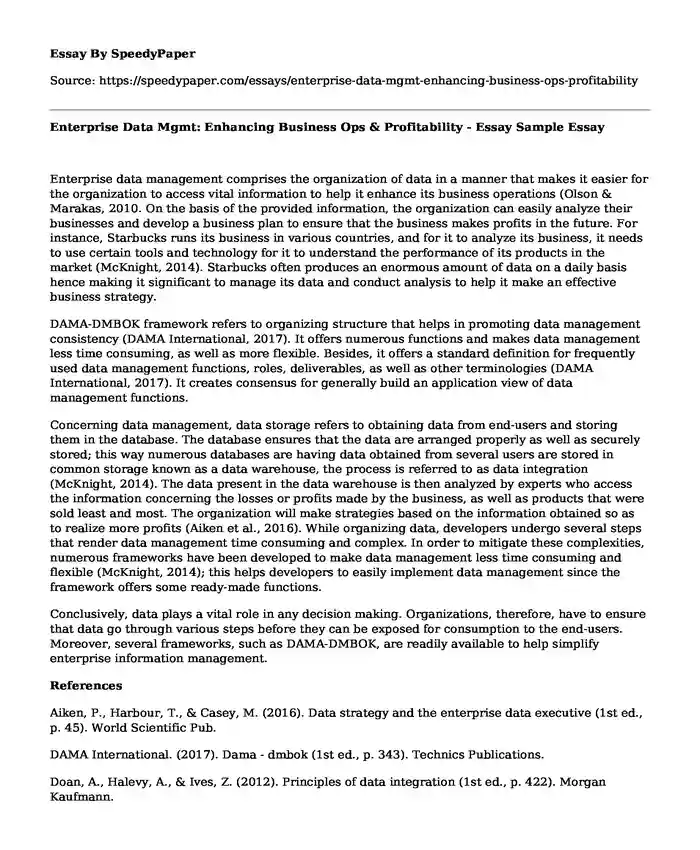
| Type of paper: | Essay |
| Categories: | Management Business Data analysis |
| Pages: | 2 |
| Wordcount: | 486 words |
Enterprise data management comprises the organization of data in a manner that makes it easier for the organization to access vital information to help it enhance its business operations (Olson & Marakas, 2010. On the basis of the provided information, the organization can easily analyze their businesses and develop a business plan to ensure that the business makes profits in the future. For instance, Starbucks runs its business in various countries, and for it to analyze its business, it needs to use certain tools and technology for it to understand the performance of its products in the market (McKnight, 2014). Starbucks often produces an enormous amount of data on a daily basis hence making it significant to manage its data and conduct analysis to help it make an effective business strategy.
DAMA-DMBOK framework refers to organizing structure that helps in promoting data management consistency (DAMA International, 2017). It offers numerous functions and makes data management less time consuming, as well as more flexible. Besides, it offers a standard definition for frequently used data management functions, roles, deliverables, as well as other terminologies (DAMA International, 2017). It creates consensus for generally build an application view of data management functions.
Concerning data management, data storage refers to obtaining data from end-users and storing them in the database. The database ensures that the data are arranged properly as well as securely stored; this way numerous databases are having data obtained from several users are stored in common storage known as a data warehouse, the process is referred to as data integration (McKnight, 2014). The data present in the data warehouse is then analyzed by experts who access the information concerning the losses or profits made by the business, as well as products that were sold least and most. The organization will make strategies based on the information obtained so as to realize more profits (Aiken et al., 2016). While organizing data, developers undergo several steps that render data management time consuming and complex. In order to mitigate these complexities, numerous frameworks have been developed to make data management less time consuming and flexible (McKnight, 2014); this helps developers to easily implement data management since the framework offers some ready-made functions.
Conclusively, data plays a vital role in any decision making. Organizations, therefore, have to ensure that data go through various steps before they can be exposed for consumption to the end-users. Moreover, several frameworks, such as DAMA-DMBOK, are readily available to help simplify enterprise information management.
References
Aiken, P., Harbour, T., & Casey, M. (2016). Data strategy and the enterprise data executive (1st ed., p. 45). World Scientific Pub.
DAMA International. (2017). Dama - dmbok (1st ed., p. 343). Technics Publications.
Doan, A., Halevy, A., & Ives, Z. (2012). Principles of data integration (1st ed., p. 422). Morgan Kaufmann.
McKnight, W. (2014). Information management (1st ed., p. 421). Morgan Kaufmann.
Olson, D., & Marakas, G. (2010). Enterprise information systems (1st ed., p. 223). World Scientific Pub.
Cite this page
Enterprise Data Mgmt: Enhancing Business Ops & Profitability - Essay Sample. (2023, Nov 14). Retrieved from https://speedypaper.net/essays/enterprise-data-mgmt-enhancing-business-ops-profitability
Request Removal
If you are the original author of this essay and no longer wish to have it published on the SpeedyPaper website, please click below to request its removal:
- Essay Sample for You: Tips and Tricks of Being a Good Student
- Essay Example on Critical Incident Stress Debriefing and Critical Incident Stress Management
- Essay Example Comprising the Supply Chain Analysis of Tesco Supermarket
- Essay Example on Apple Inc. in a Competitive Environment
- Free Essay Sample: The Common Oxidizers in the Scenario
- Paper Example on Creating Competitive Advantages
- Political Temperature in China: Impact on Tesla Expansion - Essay Sample
Popular categories




